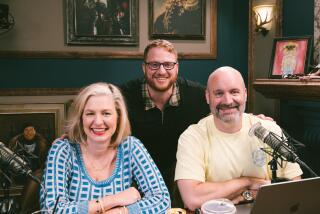Hemingway Returning to L. A. Airwaves : Talk Show Host Tuning In Again
Like a rough sea suddenly gone flat, radio talk show host Carole Hemingway’s frenetic monologue about her life over the last several years stops short when she fixes her eyes on an interviewer and asks, “Have you ever been fired?”
The answer is no. She continues talking, much quieter now.
“It’s a terrible experience,” she says. “It’s awful. It’s terrible. Especially when it’s so exposed. You’re knocked off balance. You have to find your balance. You have to keep going.”
Hemingway was fired from KABC radio in Los Angeles in July, 1982, after having a show there for eight years. She has not worked for a Los Angeles station since, although she has been in radio in New York City and elsewhere in the interim.
But on Monday, Hemingway’s voice will return to the local airwaves when she begins hosting a weekday talk show for KGIL-AM (1260) in Mission Hills.
‘I’m Going to Talk’
“What am I going to do with the show? I’m going to talk! And I’m going to get people to talk to me,” she says. “We’re going to do a lot of call-ins. Somebody said to me--and this is a really California thing to say--that doing a talk show is a real Zen experience. And it is. You don’t know what’s going to happen from minute to minute. I don’t even know what I’m going to say.”
At 38, Hemingway looks enough like Joan Rivers that people have stopped her in stores and mistaken her for the comedienne. The resemblance increases as her verbal improvisations gain momentum. She can talk fast.
She becomes more cheerful talking about her future in local radio than she is recalling her recent years away from Los Angeles. KGIL hired her to replace national network programming between 10 a.m. and 2 p.m.
Overall Ratings Down
Hemingway did a 7 p.m.-to-midnight show for KABC. Ratings had started slipping before she was let go.
In an interview shortly after she was fired, station manager George Green said he chose to replace her with another veteran Los Angeles talk show host, Hilly Rose, to boost the numbers. But Green said that ratings were falling off across the board for KABC’s evening broadcasts, including Dodger baseball games, and that Hemingway’s firing was “not because of a lack of talent.”
After leaving KABC, Hemingway wrote a syndicated newspaper column, worked at radio station WABC in New York and reported for a syndicated TV magazine show, “Breakaway.”
But Los Angeles is the city she considers home, and is where she wants her career to be revived and endure, she says. On Friday, she called it “a jittery time now” with Monday’s debut of her show approaching.
Conversation Mechanic
A sort of conversation mechanic, she can tune up the give and take and knows how to let it settle down when it’s gotten too fast. She has a professional’s repertoire of techniques for jump-starting a dialogue that has stalled. “That’s a very interesting viewpoint,” she’ll say. Or “I don’t think I’ve ever looked at it quite that way.” Or “What makes you think that?”
She says the challenge of living in New York City, where she spent much of the past two years, was an education in survival that she will share during her first few shows for KGIL. “New York is a school by itself,” she says. “Even getting your laundry done can be traumatic. It was a real lesson for this California girl. I’m going to talk a lot about New York.”
The San Francisco-born Hemingway got into radio after earning a degree in international relations from Stanford University. She worked as an actress at the American Conservatory Theatre in San Francisco, then moved to Phoenix with her husband in the early 1970s. Needing work, she fell into a job at radio station KPHX in Phoenix and became an on-air personality.
In 1974, with her marriage on the rocks and KPHX switching to a Spanish-language format, she moved to Los Angeles and KABC.
Name ‘Still Sells’
Tom Lundy, director of programming and operation at KGIL, is blunt in explaining why he hired Hemingway. “Her name is still known in this town. It still sells. And you have to be honest about it, the selling part is important. You have to think about the business side of it.”
“Oh, really?” Hemingway says after listening to Lundy in a studio at KGIL. “Wasn’t it just because you loved what I do?” And then she laughs.
“You learn a lot when you’ve been fired,” she says shortly after Lundy leaves the room. “You learn about survival. And not to take yourself so seriously. . . .
“To tell you the truth, I’m glad I had the experience. Which is something I’m going to talk about.”
More to Read
The complete guide to home viewing
Get Screen Gab for everything about the TV shows and streaming movies everyone’s talking about.
You may occasionally receive promotional content from the Los Angeles Times.






